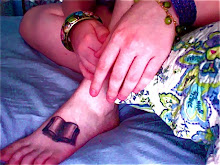The creature's abandonment reminds me of a little Ugandan girl named Mirembe. Her parents had deserted her because she is stricken with sickle-cell anemia. Alone in a dirty shack, Mirembe was much like the creature in the woods. Luckily, being an adorable child, Mirembe was rescued and adopted; the creature, a conglomeration of different corpses, was no where near that fortunate. He was forced to teach himself how to eat and keep warm, how to talk and read, things we all take for granted because our parents provide it for us.
Eventually the creature comes into contact with Frankenstein again and practically begs for a scrap of happiness, that is, a female creation like himself that he can love. Frankenstein almost yields, saying "His tale and the feeling he now expressed proved him to be a creature of fine sensations, and did I not as his master owe him all the portion of happiness that it was in my power to bestow?" (pg. 178) Frankenstein recognizes that he has a responsibility to make the creature happy, but does not because he firmly believes the creature to be forever a horrific being.
Abandoned, betrayed, and attacked time and time again, the monster turns into a bitter murderer, displaying how bad parenting can deeply affect someone's life. Marge Piercy states in A Work of Artifice that, "With living creatures one must being very early". No matter how grotesque the creature is he is still a living thing, and in the beginning he had no one to take care of him, turning him into the infamous Frankenstein's monster.






Arnold would say: Never ever use "I." Unproffesional. Don't say "we" either; always state who you are speaking about. In this case, it would be "people." Comma splices are inproper grammar. They're worth two points. You have twelve in here alone. That's twenty four points... Only in comma splices!
ReplyDeleteI say: This is great! Was this for English? If so, it is one hundred percent better than mine was!
I don't even know what a comma splice is... haha. And yeah. We were supposed to write it in class today but I wrote it ahead of time and just rewrote it in class... :P
ReplyDeleteAnd thankya dearrrr. It could probably be better. But I'm fine with it. It's for the midterm.
Comma splice: Words, words, more words.
ReplyDeleteSix years later...I wouldn't take grammar advice from someone who can't spell "unprofessional" correctly.
ReplyDeleteand says unproper instead of improper. who is this clown?
Deletewhoops, i mean "inproper"
Delete